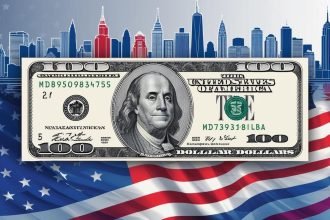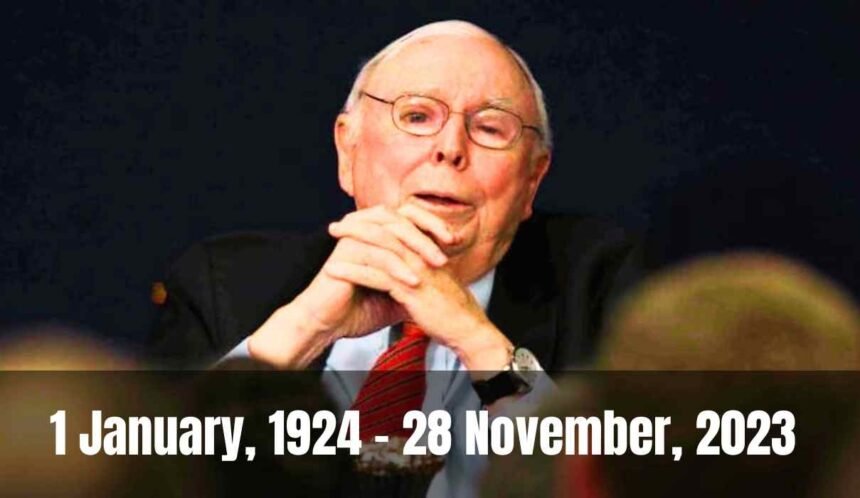OMAHA, Nebraska – Charlie Munger, the erudite investor who became renowned as much for his wit and wisdom as his investing acumen over nearly six decades alongside Warren Buffett, died Tuesday at the age of 99, according to an announcement from Berkshire Hathaway.
As vice chairman of Buffett’s conglomerate Berkshire Hathaway, the straight-talking Munger was an integral part of the company’s transformation from a struggling textile business into one of the world’s most successful and respected investment vehicles.
“Berkshire Hathaway could not have been built to its present status without Charlie’s inspiration, wisdom and participation,” Buffett said in a statement, calling Munger “my indispensable partner.”
From Cigar Butts to Competitive Advantages
When the duo first met in 1959, Buffett was running an investment partnership and Munger had his own investment operation on the side while practicing law. Recognizing kindred spirits in each other, they developed a fast friendship and laid the foundation for a monumentally successful business relationship built on trust.
As Buffett acknowledged, Munger convinced him to evolve from buying so-called “cigar butts” – beaten-down companies available for bargain prices – to investing in high-quality companies with durable competitive advantages and the ability to consistently grow profits.
With Munger’s guidance, Buffett transformed from a disciple of value investing legend Benjamin Graham into an even more successful investor in his own right.
“Charlie set the course for building a business that would combine huge satisfactory profits with the highest ethical standards,” Buffett said. “The blueprint he gave me was simple: Forget what you know about buying fair businesses at wonderful prices; instead, buy wonderful businesses at fair prices.”
From the modest beginnings of a struggling New England textile company, Berkshire Hathaway under Buffett and Munger’s leadership grew into a $700 billion empire spanning insurance, utilities, manufacturing, retail and services.
Even in his late 90s, Munger displayed the intellectual firepower that helped him earn Buffett’s trust and respect over their six-decade relationship. At Berkshire Hathaway’s famous annual shareholder meetings, throngs of investors would pack an Omaha arena to hear Buffett and Munger opine on business, the economy and life.
A Multifaceted Life Full of Twists and Turns
Munger’s path to fame and fortune took plenty of unexpected turns along the way.
Born in Omaha on New Year’s Day 1924, young Charlie lived just blocks away from Warren Buffett but the two didn’t meet until later in life. Munger came from an esteemed family of lawyers and judges.
After studies at the University of Michigan and Caltech were interrupted by World War II service, Munger completed law school at Harvard and moved to California to practice real estate law.
When Munger’s father died in 1959, he returned to Omaha and finally crossed paths with Buffett. According to Buffett, they “were born to be partners” and wasted no time in acting on a vision for a new kind of company.
But tragedy struck Munger’s personal life shortly thereafter when his young son died of leukemia and his first marriage dissolved. Later health troubles would claim the sight in one of his eyes. Through it all, Munger pressed forward, building Berkshire alongside Buffett and amassing his own fortune.
Architecture Aficionado with a Knack for Design
Beyond business, Munger cultivated expertise in fields like architecture and design. With no formal training, he sketched plans for dormitories and homes near the University of California at Santa Barbara that became affectionately known as “Mungerville.”
“For a guy who never took a single architecture course, I caught on a lot,” Munger quipped in a 2017 interview.
His maxlength home sat perched atop a oceanside cliff he engineered himself on 22 acres of land assembled through years of quiet purchases from neighboring property owners.
The sprawling multi-wing single-story abode featured floor-to-ceiling windows offering panoramic Pacific Ocean views, bespoke walk-in closets, underground garages and a network of underground tunnels connecting the various wings.
True to form, Munger espoused grounded perspectives on wealth and consumption.
“I don’t believe in dynastic wealth,” he said in a 2021 interview. “I try to live a normal life. I don’t want anyone to know where my house is.”
Pillar of Wisdom
Extolling the benefits of lifelong learning across a kaleidoscope of disciplines, Munger relished opportunities to tackle new domains.
“Learning has never stopped for Charlie and neither has teaching,” Buffett once remarked of his friend and confidante.
When Munger felt conventional thinking came up short, he devised his own explanatory concepts like the “lollapalooza effect” – an confluence of multiple forces operating in concert to produce outsized outcomes.
Rather than study success stories, Munger fixated on understanding failures and mistakes. He emphasized analyzing decisions not just by their outcomes by also the quality of thought that preceded them.
Speaking engagements featuring Munger became well-known for distilling practical wisdom on life, leadership and decision making. He urged individual investors to expand their “circle of competence” before wading into new areas. And he stressed knowing where that circle ends as much as where it begins.
“Acknowledging what you don’t know is the dawning of wisdom,” Munger said repeatedly over the years.
But with Berkshire as his primary passion later in life, Munger always sought to deflect attention from himself and shine the spotlight on Buffett instead. When queries came his way at shareholder meetings once Buffett had finished speaking, Munger often replied simply:
“I have nothing further to add.”
The Berkshire Blueprint
As one of the world’s most successful capital allocators, Munger always kept the Berkshire balance sheet and the trust of partners, shareholders and regulators as north stars guiding investment decisions.
“Rule number one is never lose money,” he often remarked. “Rule number two is never forget rule number one.”
Rather than engineering flashy deals, Munger embraced simplicity and discipline across operations. At its core, the Berkshire model consists of answering three key questions when deploying its ever-rising pile of cash:
- Will this business generate more cash than we pay for it?
- Will we allocate those funds better than current owners?
- Will this company remain a source of value creation 10 to 20 years from now?
The unmanning quest for companies able to “stand the test of time” made Berkshire’s collection of subsidiaries a distinctly durable bunch compared to go-go growth stocks that flare out when business conditions shift.
Peppering conversations with Latin phrases and references spanning centuries, Munger put a high premium on depth and multiple mental models rather than narrow expertise.
“You’ve got to have models in your head,” he stressed. “You’ve got to array your experience – both vicarious and direct – on this latticework of models.”
But that broad perspective didn’t stop Munger from issuing opinions as pointed as one of his cherished box cutter knives.
Take Bitcoin for example. To Munger, the cryptocurrency amounted to nothing but “noxious poison” that enabled “kidnappers and extortionists.”
Munger soured on his alma mater after watchdogs highlighted the outsized admissions advantages given to already-privileged applicants.
“I think Harvard has disgraced itself,” Munger said in 2019.
Formula for Contentment
While Munger clearly reveled intellectual combat, close associates describehim as a genuinely contented person despite – or perhaps because of – the many setbacks he persevered through over nearly a century of life.
In his blueprint for satisfaction, Munger emphasized the power of gratitude and avoiding the kind of resentment that poisons the mind.
“You stay cheerful in spite of your troubles,” he advised. “You deal with reliable people and you do what you’re supposed to do. All these simple rules work so well to make your life better.”
Buffett says living up to the daily expectation of someone like Munger made him a better man over their 63 years side-by-side.
In a relationship spanning nearly the entirety of their adult lives, yet remarkably devoid of arguments, Buffett and Munger made an indelible impact on one another.
Said Buffett: “People find this hard to believe, but in 60 years, we’ve never had an argument. We have disagreed about things and we’ll probably keep occasionally disagreeing about this or that, but if you define an argument where emotion starts entering into it or anger or anything of the sort it just doesn’t, it doesn’t happen.”





